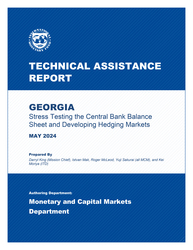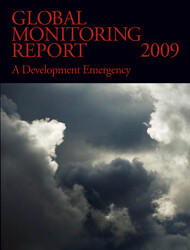
Georgia: Technical Assistance Report-Report on Stress Testing the Central Bank Balance Sheet and Developing Hedging Markets
Georgia: Technical Assistance Report-Report on Stress Testing the Central Bank Balance Sheet and Developing Hedging Markets
READ MORE...
Volume/Issue:
Volume 2024
Issue 038
Publication date:
ISBN:
Add to Cart by clicking price of the language and format you'd like to purchase
Available Languages and Formats
Topics covered in this book
This title contains information about the following subjects.
Click on a subject if you would like to see other titles with the same subjects.
Banks and Banking , Finance , Money and Monetary Policy , International - Economics , Georgia , Monetary policy transmission , Central bank policy solvency , Central bank independence , Financial market development , Foreign exchange markets , Money markets , , NBG balance sheet , hedging market , Department mission , market infrastructure , request of the National Bank of Georgia , Financial statements , Hedging , Currency markets , Exchange rate risk , Global , Eastern Europe
Summary
This CD engagement covered two distinct areas to help the National Bank of Georgia (NBG) deliver on its price stability mandate, it: 1) provided a forward-looking analysis of the NBG’s balance sheet to assess its policy solvency and to help institutionalize such a process, and 2) outlined a strategy to develop hedging instruments in interest rate and foreign exchange (FX) markets to support monetary policy transmission.
With virtually no interest-bearing liabilities, the NBG balance sheet is robust. Under the adverse shock, it improves on account of FX revaluation gains. Higher inflation also helps, since the need for a higher policy rate generates larger domestic interest income. Institutionalizing this analysis allows for early warning of the need to reduce dividend payments (or for re-capitalization) thereby supporting operational independence.
Georgia has made good progress on many of the enabling conditions for developing hedging markets, but several structural factors provide challenges. A supportive regulatory environment is in place, market infrastructure is robust, and there is a range of instruments available to serve as the underlying instrument for derivatives. However, there is a lack of heterogeneity of financial risk profile and appetite amongst participants. Recommendations include setting up a standardized FX forward trading platform, pushing for upgrades of banks’ treasury management systems, supporting the targeted education and training efforts of the Georgian Financial Markets Treasuries Association, revising the current FX forward index to be more informative by publishing outright transacted rates; and publishing Overnight Indexed Swap benchmarks.
Copyright © 2010 - 2026
Powered by:
AIDC



